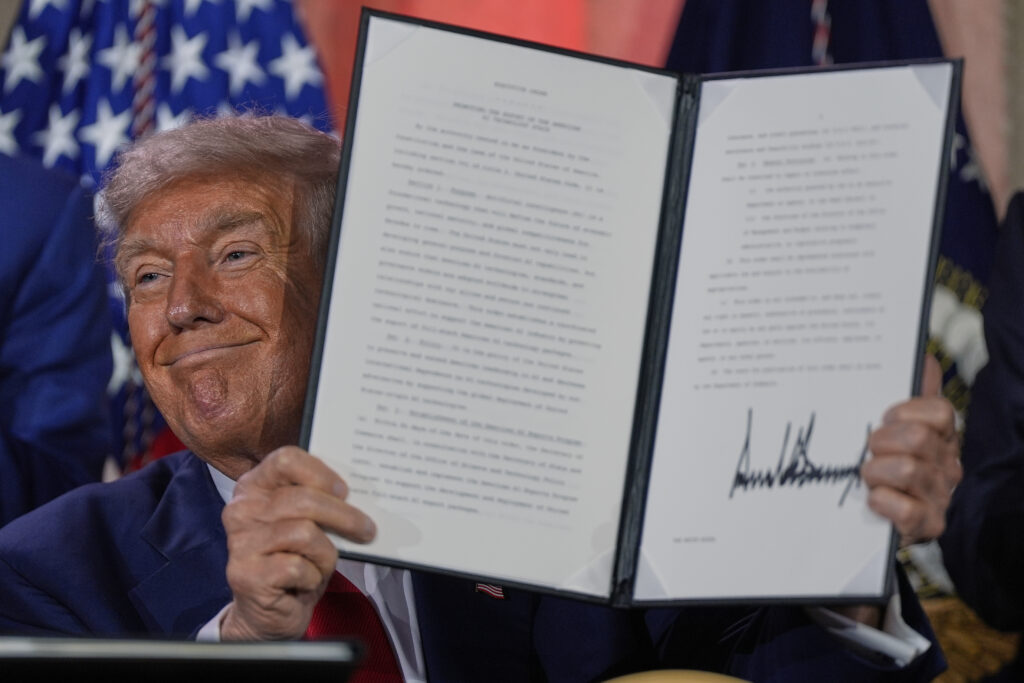In Attempt to Expand Use of Troops Domestically, Trump Issues New Executive Orders

President Donald Trump signed new executive orders Monday that would expand the scope of the military’s operations in Washington, D.C.
Trump is directing Defense Secretary Pete Hegseth to “immediately” create a specialized unit within the D.C. National Guard “that is dedicated to ensuring public safety and order in the Nation’s capital.”
The order also directs Hegseth and the heads of other federal agencies to “deputize the members of this unit to enforce Federal law.”
That order seems to run counter to the Posse Comitatus Act of 1878, which generally prohibits using the military in civilian law enforcement purposes under normal circumstances. Trump’s deployment of the national guard in Los Angeles earlier this year is currently being challenged in federal court for violating the law. An order in that case is still pending, but at trial, Judge Charles Breyer signaled his intention to rule against the Trump administration.
However, the order references “Title 32” of the United States Code, which Janessa Goldbeck of the Vet Voice Foundation argues is an attempted end-around on that law. “Make no mistake: this is a workaround of the Insurrection Act,” she wrote in a blog post. “Instead of bearing the political and legal costs of invoking it, Trump is preparing to use Title 32 as a backdoor to deploy friendly state Guards as his personal police force, across state lines, into communities that do not want them there, with full law enforcement powers.”
The order also directs Hegseth to prepare the national guard units in each state to be ready to “assist Federal, State, and local law enforcement in quelling civil disturbances and ensuring the public safety and order whenever the circumstances necessitate,” and ensure “an appropriate number” of each state’s guardsmen are “reasonably available for rapid mobilization.”
This provision would seem to presage the widespread deployment of federal troops across the country. Trump has mused publicly about declaring a federal crime emergency in other cities — all in states run by Democrats — most recently saying he would like to repeat his D.C. actions in Chicago.
Legal scholars have noted that while federal law allows the president some authority to deploy national guardsmen for domestic missions, he does not hold a blank check.
The order directs the U.S. National Park Police and the U.S. Attorney for D.C., Jeanine Pirro, to step up hiring.
Trump also issued three other executive orders Monday. Two purport to end cashless bail — one is directed specifically at D.C., while the other is aimed at the rest of the nation. The orders direct the Office of Management and Budget to work with other federal agency heads to withhold federal grants to jurisdictions that don’t use cash bail.
Congress, not the president, has the power to impose conditions on the receipt of federal funds under the Spending Clause — although the Supreme Court has allowed this administration to unilaterally cut grants in some situations, at least while lower courts consider lawsuits challenging those cuts.
Even when Congress places conditions on federal grants, the Supreme Court has imposed limits on them, given the 10th Amendment’s reservation of rights to the States. Specifically, the Court has held that the requisites must relate to the conditions of the relevant spending — so federal grants unrelated to criminal justice matters presumably couldn’t be made conditional on cashless bail.
When Trump was arrested in New York in 2023, he himself did not need to post cash bail in order to remain free before his trial, which ultimately found him guilty of 34 felony counts.
A fourth order directs Attorney General Pam Bondi to prioritize prosecution of the U.S. flag being burned. The Supreme Court held in a 1989 opinion authored by Justice Antonin Scalia that desecration of the flag was a form of political speech protected by the First Amendment.
The new orders come two weeks after Trump declared a “crime emergency,” in D.C. and ordered federal law enforcement agencies and the national guard to begin patrolling the streets of the nation’s capitol.